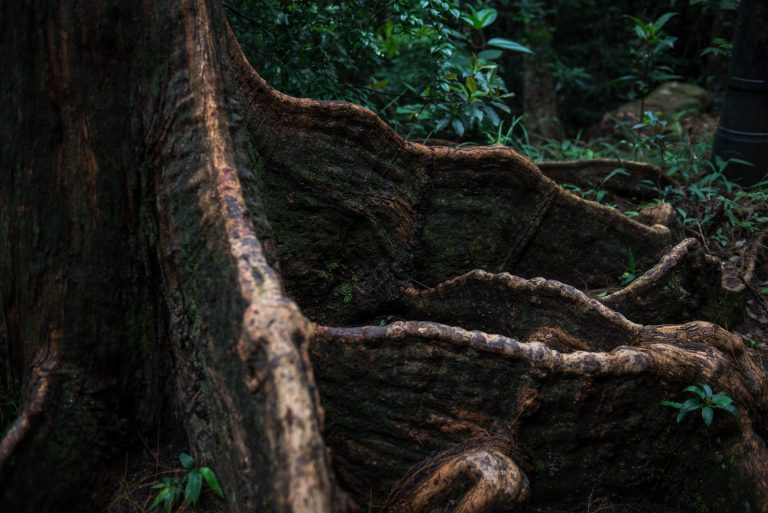
Image by Chanachai Panichpattanakij/Getty Images, © All Rights Reserved.
A Faith That Is Anchored and Sustained
I was recently looking at the oldest copy of Rumi’s masterpiece, the Masnavi. This is a massive, 50,000 line, six volume mystical allegory that begins with our current state of brokenness and calls us back to a path of Radical Love, before culminating in a story of what it means to be a whole human being. I didn’t make it past the first line.
“This is the book of the rhyming couplets,
and it is the root of the root of the faith.”
It was that phrase, “root of the root” that caught my imagination. Right there, in a red pen, like a teacher would grade an exam, an editor had made a correction:
“This is the book of the rhyming couplets,
and it is the root of the root of the root of the faith.”
We don’t know much about who copied the original manuscript, but we know the handwriting of the red-pen editor. It’s a famous person: Rumi’s own son, Sultan Valad. The correction dated back to the year 1278, less than five years after Rumi’s own passing. This is an ancient correction.

It’s not enough to know about the root of our faith. Or even the root of the root of the faith. We need the root of the root of the root of the faith. But what does it mean to speak of the root of a faith, the marrow of our existence?
I’ve been thinking for a while about the need to have a faith that is robust, moist, grounded, and rooted. Maybe it has something to do with having been in Northern California and seeing these majestic redwood trees. Maybe I’ve been fascinated by these majestic living organisms that need to be rooted and anchored to withstand the storms of life. We too yearn for a faith that is robust, moist, grounded, and rooted.
This metaphor of faith as trees is an ancient one. Muslim sages loved to make a distinction between “roots” and “branches.” Faith has different branches, but they called us to focus on the roots. The branches are many, there are many rules and regulations. The sages called us to keep exploring what it is that roots us, that grounds us, that anchors us.
Is it our family? Is it our reputation? Is it our income? Is it self-confidence?
If these are what root us, what in turn roots them? If so, what is the root of our root? What is it that anchors our family? What is it that anchors our reputation? What is it that anchors our incomes? What is it that anchors our self-confidence? Trees need to be anchored and rooted, and so do we. So does our faith.
Roots do two things for trees: they anchor the tree, and they draw up nutrients and sustenance for it. We are like these trees — we need to be anchored, and we need to be sustained. If the roots of the tree are weak, the tree won’t be anchored properly. When the first real storm hits, a tree may be knocked down.
We are like this. In life, there will be storm after storm. Sometimes we will find ourselves in the eye of the hurricane. Do we try to write our way out? Are we grounded? Are we rooted? And maybe just as importantly, is the thing that roots us itself rooted?
If we are grounded in our family’s love, what do we do when our family is knocked down? If we are rooted in our reputation, what do we do when our reputation — fairly or unfairly — takes a hit? What is the root of our root?
Roots do one more thing for us: They give us access to nutrients and sustenance. How often we see a tree that’s no longer sustained. It becomes brittle, dry, and fails to give fruit. Eventually, it withers and dies.
How often we see a dried-up kind of faith. How often we see a faith that is no longer kind, no longer generous, no longer tender, no longer just, no longer giving fruit. There is a difference between being religious and being kind. We see so many, in every faith tradition, who have faith in the “right” kind of theology, and maybe even observe the right rituals, but there is no tenderness, there is no moisture, there is no love.
May we be rooted. May what roots us itself be rooted.
And as the handwriting of Rumi’s son indicated, may we keep rooting and anchoring and grounding our roots, so that we may soar. The soaring, the reaching, heavenwards is already connected to the grounding. We can only soar through what is grounded.
Then, and only then, is it possible to return to the rest of that first line:
“This is the book of the rhyming couplets,
and it is the root of the root of the root of the faith,
in the unveiling of the heart secrets of certainty,
and union with the Divine Beloved.”
May we find the root of the root of the root of our existence. May we find the marrow of our being and come to seek these secrets for union in our own hearts.
So, my friend, what roots you? What anchors you? And what roots what roots you? How grounded are we? And how moist and nourished is the marrow of our soul?
